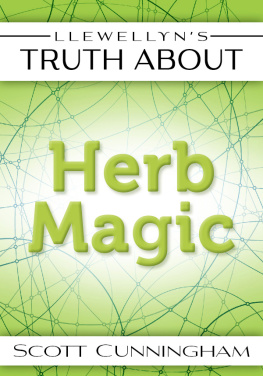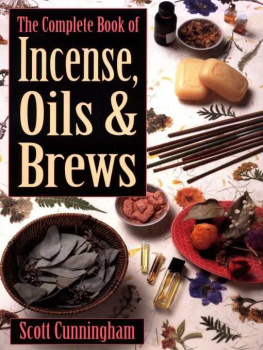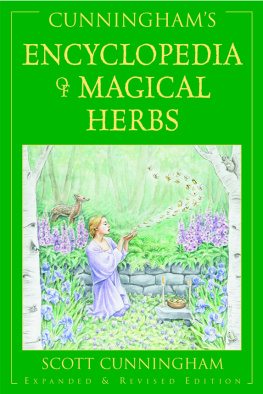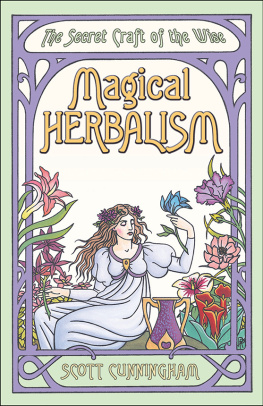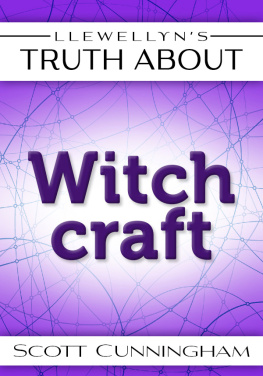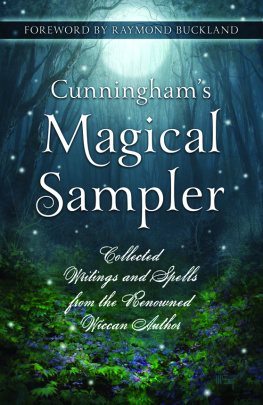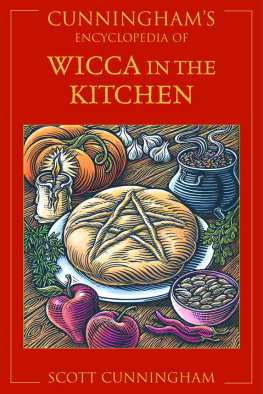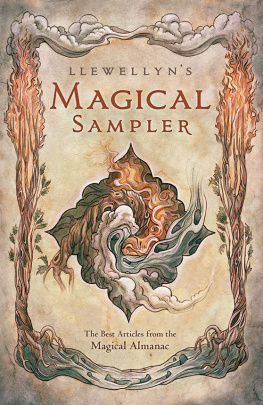Scott Cunningham - Llewellyns Truth About Herb Magic
Here you can read online Scott Cunningham - Llewellyns Truth About Herb Magic full text of the book (entire story) in english for free. Download pdf and epub, get meaning, cover and reviews about this ebook. year: 2013, publisher: Llewellyn Worldwide, LTD., genre: Religion. Description of the work, (preface) as well as reviews are available. Best literature library LitArk.com created for fans of good reading and offers a wide selection of genres:
Romance novel
Science fiction
Adventure
Detective
Science
History
Home and family
Prose
Art
Politics
Computer
Non-fiction
Religion
Business
Children
Humor
Choose a favorite category and find really read worthwhile books. Enjoy immersion in the world of imagination, feel the emotions of the characters or learn something new for yourself, make an fascinating discovery.
- Book:Llewellyns Truth About Herb Magic
- Author:
- Publisher:Llewellyn Worldwide, LTD.
- Genre:
- Year:2013
- Rating:3 / 5
- Favourites:Add to favourites
- Your mark:
- 60
- 1
- 2
- 3
- 4
- 5
Llewellyns Truth About Herb Magic: summary, description and annotation
We offer to read an annotation, description, summary or preface (depends on what the author of the book "Llewellyns Truth About Herb Magic" wrote himself). If you haven't found the necessary information about the book — write in the comments, we will try to find it.
Join renowned author Scott Cunningham in an exploration of the magical uses of your favorite herbs and plants.
Llewellyns Truth About Herb Magic — read online for free the complete book (whole text) full work
Below is the text of the book, divided by pages. System saving the place of the last page read, allows you to conveniently read the book "Llewellyns Truth About Herb Magic" online for free, without having to search again every time where you left off. Put a bookmark, and you can go to the page where you finished reading at any time.
Font size:
Interval:
Bookmark:
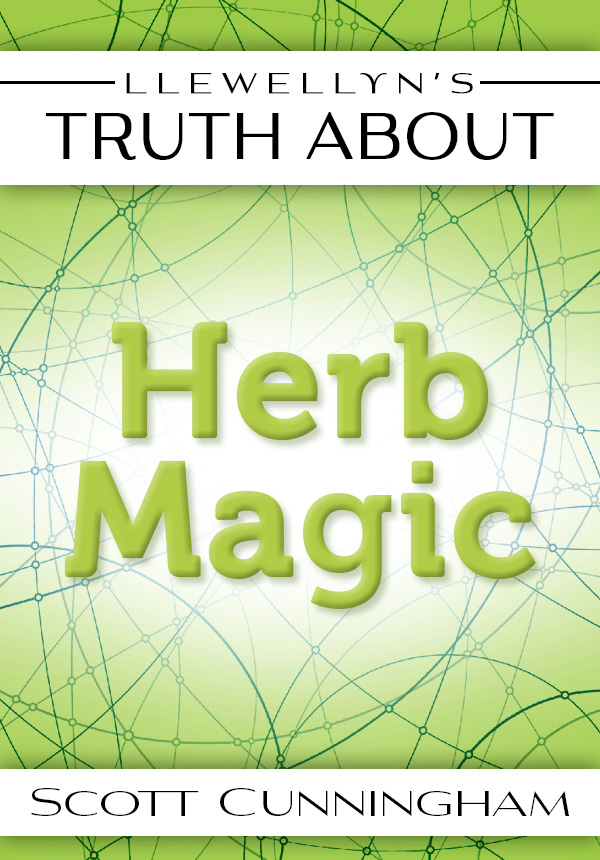
About the Author
Scott Cunningham practiced magic for over twenty years. He was the author of over thirty fiction and non-fiction books. Cunninghams books reflect a broad range of interests within the New Age sphere, where he was highly regarded. He passed from this life on March 28, 1993 after a long illness.
Copyright Information
The Truth About Herb Magic 1993 by Scott Cunningham. All rights reserved. Manufactured in the United States of America. No part of this e-book may be used or reproduced in any manner whatsoever including Internet usage, without written permission from Llewellyn Publications, except in the form of brief quotations embodied in critical articles and reviews.
As the purchaser of this e-book, you are granted the non-exclusive, non-transferable right to access and read the text of this e-book on screen. The text may not be otherwise reproduced, transmitted, downloaded, or recorded on any other storage device in any form or by any means.
Any unauthorized usage of the text without express written permission of the publisher is a violation of the authors copyright and is illegal and punishable by law.
First e-book edition 2013
E-book ISBN: 978-0-7387-3864-2
Llewellyn Publications is an imprint of Llewellyn Worldwide Ltd.
Llewellyn Publications does not participate in, endorse, or have any authority or responsibility concerning private business arrangements between our authors and the public.
Any Internet references contained in this work are current at publication time, but the publisher cannot guarantee that a specific reference will continue or be maintained. Please refer to the publishers website for links to current author websites.
Llewellyn Publications
Llewellyn Worldwide Ltd.
2143 Wooddale Drive
Woodbury, MN 55125
www.llewellyn.com
Manufactured in the United States of America
INTRODUCTION
Why would a woman tuck a sachet of lavender beneath her pillow? What would motivate a rational man to sprinkle dried basil around his store before opening for business each morning? And for what reason would a grandmother grow garlic beside her home?
These persons, and countless others, have discovered the magic within herbsthat subtle yet very real energy which can be harnessed to bring love, money, protection, psychic awareness, success, and happiness into our lives. Herb magic (the use of the subtle powers of plants to manifest needed change) is one of the oldest and most effective methods of magic. Its inexpensive and can be performed by anyone. Yet even today few know the truth about this ancient practice.
What is the truth about herb magic? Is it all psychology? Can it truly improve our lives? Do these plants really have any power? Are spirits or demons involved? Is herb magic dangerous? What are its limitations? How should we use herbs in magic? What are the best herbs to use? Where can we find them? These and many more questions will be answered in Llewellyn's Truth About Herb Magic.
THE ORIGINS OF HERB MAGIC
Herb magic began in the distant past, when humans first began experimenting with the plants that they found growing around them. Color, form, scent, and taste attracted humans to certain plants. Our ancestors eventually discovered many uses for these seemingly simple life forms: food, clothing, medicine, adornment, and ritual. We cant know how or why certain plants began to be used in ritualistic ways. We can only guess that a plants fragrance was involved, at least in the earliest times, when the human sense of smell was far more powerful than it is today. Rich fragrances rising from a plant may have caused it to be linked with Spiritwith all that was unknowable.
Additionally, these early humans may have also been aware of the spiritual energies that hum within herbs. The ability to feel such energies would today be described as psychic awareness or psychic sensitivity. If our ancestors possessed this talent, they probably utilized it to discover further uses for plants. This is speculation. However, by 3000 BCE, many plants were being regularly used in magic in Egypt, Sumer, and elsewhere. By 200 BCE, plant magic was firmly entrenched in human life. Literally thousands of plants (some rare and costly) were called upon to smooth the path of human existence in Europe, Africa, the Americas, Asia, and elsewhere.
The first herbals (descriptions of plants and their uses) were written in ancient Greece. Most herbals included magical as well as medicinal information. Such books were copied and recopied for centuries, further spreading magical herbal lore. Much information was also handed down between herbal practitioners and their students. Greek and Roman texts were copied and disseminated during the 1400s in Europe. Among these were some of the most famous herbals.
Eventually, this mass of accumulated lore made its way outward from the great centers of learning (and learned individuals) and found nourishing soil in the common folk. Herb magic and herbal medicine were freely mixed. Herbalists uncovered the ritual uses of the plants that grew in their areas. Spells were reworked, invented, and passed on to others. Herb magic bloomed and sent out new roots.
HERB MAGICS DARKEST HOURS
It isnt until Christianity began to stamp out all remaining traces of pre-Christian practices that herb magic began to suffer a decline. Centuries-old practices were suddenly condemned by a Church that had grown frightened of persons with power. Herb magic went underground or was adapted. Much of the old lore was lost.
It wasnt safe to roam the forest at ni ght searching for rare plants. No longer could herbalists openly collect herbs at sunrise while singing incantations. Magicians dared not draw circles around plants with magic swords before digging.
Herb magic was relegated to the realm of superstition: Its just bad luck to have that plant in the house. That herb will bring love. Keep a bay leaf in your purse for protection. No, I dont know why; my mother always used to do it. Its a family tradition.
And so the herbs patiently waited for humans to rediscover their incredible powers.
THE RENAISSANCE OF HERB MAGIC
Fortunately, the herbs didnt die out, and neither did much of the information. The great herbals by Theophrastus, Dioscorides, Apuleius, Gerard, Coles, and others preserved much herb magic, as did the works of Pliny, Agrippa, Porta, and other early writers. Scraps of manuscripts housed in museums had preserved fragments of early herbal magic. Enough remained, both in published form and within folk practice, to allow the rebirth of herb magic.
Renewed interest in herbal medicine and herb gardening began in the 1930s in the United States and in England. By the early 1970s, people began to explore other uses for herbs. The rebirth of herb magic had began. Most of the new herbals published from 1930 to the 1970s continued the grand tradition of including magical as well as medicinal and cosmetic applications, but few books dealt exclusively with herb magic. Herb stores and herb gardens sprang up across the country. Herb magicians grew in numbers as the United States experienced its first occult craze.
It was in this new attitude of acceptance that herb magicians studied the extant remnants of their long-suppressed avocation. Ancient tidbits of knowledge were merged. A tremendous amount of experimentation was performed. Many of the old secrets were rediscovered and put to practical use. Finally, in the 1980s, books by this writer and by others brought a wealth of information to the public regarding herb magic. Tens of thousands of persons throughout the world began discovering new uses for plants. Today, many are ready to learn the truth about herb magic.
Font size:
Interval:
Bookmark:
Similar books «Llewellyns Truth About Herb Magic»
Look at similar books to Llewellyns Truth About Herb Magic. We have selected literature similar in name and meaning in the hope of providing readers with more options to find new, interesting, not yet read works.
Discussion, reviews of the book Llewellyns Truth About Herb Magic and just readers' own opinions. Leave your comments, write what you think about the work, its meaning or the main characters. Specify what exactly you liked and what you didn't like, and why you think so.

